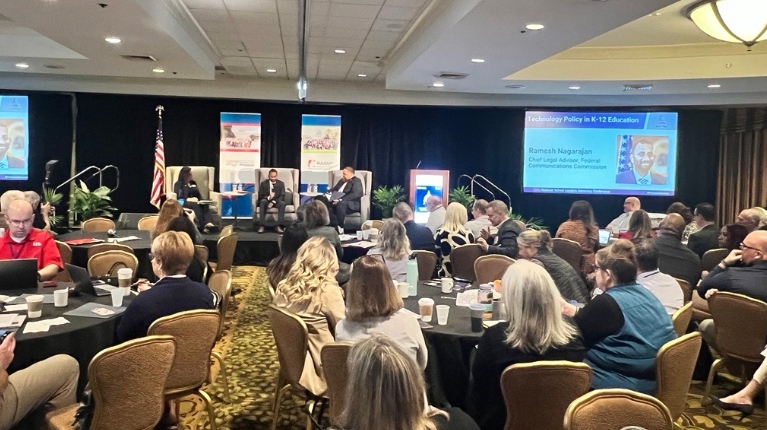EdTech Policies: Where They Stand and Implications for the Future
By: Krysia Gabenski, NAESP Editorial Director

The implementation of technology in schools has brought tremendous benefits but also new challenges that require thoughtful policymaking. We know how critical it is that school leaders are part of the conversation as policy makers consider the broader societal, ethical, and long-term impacts of education technology to guide their decision-making.
During the 2024 National School Leaders Advocacy Conference, NAESP and NASSP hosted Ramesh Nagarajan, chief legal advisor, Federal Communications Commission (FCC), for a Q&A on where edtech policies stand and the implications for the future when it comes to the digital divide, cybersecurity, AI in schools, and social media and data privacy.
The Connectivity Gap
Federal programs like E-Rate have made huge strides in connecting schools and students to the internet. However, gaps still exist, especially for lower-income and rural communities. Lack of connectivity impacts learning, limits access to digital resources, and exacerbates inequities. More work is needed to provide affordable, reliable broadband access to all.
This isn’t news to school leaders, but it’s important that they be meaningfully consulted as government agencies like the FCC innovate to meet new needs in internet connectivity.
E-rate aims to get everyone connected, said Nagarajan. The program started in 1996 with a focus on getting schools wired for internet in the first place, but now it needs to be modernized to ensure students, homes, libraries are all connected.
“One of the great things about E-Rrate has been its flexibility over time,” said Nagarajan. “That’s what we need. It was because of the feedback of school leaders that we realized that getting schools connected was great, but they needed connectivity for students at home, so we provided that. Then schools needed wifi on buses and mobile hotspots to help get their students connected.”
Those last two efforts—wifi on school buses and mobile hotspots—already under way, with funds available to support schools in equipping school buses with wifi, and potential support on the horizon for mobile hotspots in school communities.
After the FCC tackles these connectivity issues, said Nagarajan, it’s up to the federal, state, and local governments and educators to identify the remaining gaps to enable the program to evolve again to meet new needs.
Cybersecurity
While technology creates new educational opportunities, it also opens schools up to cyber threats. Cyberattacks can be devastating, leading to theft of funds, private data breaches, and disruption of operations. Schools require robust cybersecurity measures, which can be costly to implement. Policymakers must make cybersecurity a priority through increased funding and industry partnerships.
The FCC is doing its part, with its Learn without Limits proposal that aims to equip schools with the programs and resources they need to tackle cybersecurity threats.
“It’s a complicated issue, and there’s lots to be learned,” said Nagarajan, “but what the FCC can do is bring solutions to the table and bring the government officials together to create a long-term program to support K-12 schools and libraries that are looking for cybersecurity tools.”
AI in Schools
As AI plays a growing role in education, critical ethical questions arise about data privacy, biases, and transparency. Policymakers should collaborate with schools to develop appropriate AI guidelines and safeguards. Students interacting with AI systems must be protected, too. We have a responsibility to ensure AI promotes learning in an equitable, ethical way.
“We’re really in an AI moment,” said Nagarajan. “I think it’s important that we don’t want this to be another gap. For kids who don’t have connectivity, they aren’t going to have access to AI either. School leaders need to be at the table. It’s students who are experimenting with AI tools, so it’s very important that your voices are heard.”
Social Media Safety
Social media’s impact on students highlights policy gaps regarding youth data privacy and mental health. While the FCC is not charged with regulating platforms directly, it can push for stronger youth protections. Schools alone cannot fully address the challenges of social media. Policymakers, tech companies, and educators must work together.
Today’s policies will shape the future of education technology. By considering the deeper implications, we can develop balanced, forward-looking policies that maximize benefits and minimize harm. This is our opportunity to get ahead of potential pitfalls and build a more just, equitable technological future.
Follow #PrincipalsAdvocate for updates and add your voice to the conversation about the future of edtech, how you’ve overcome barriers to connectivity, and what support and resources your school still needs.
